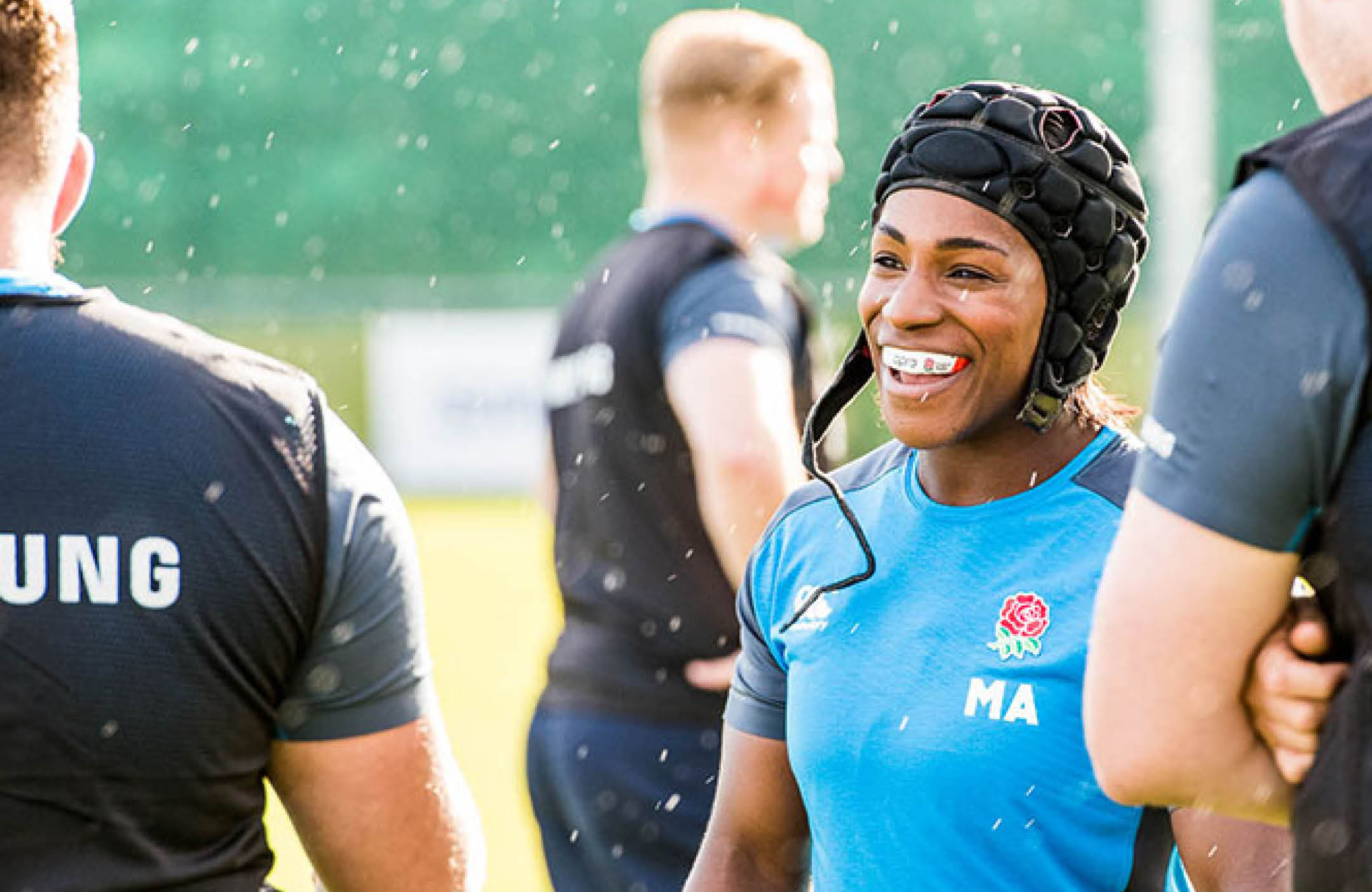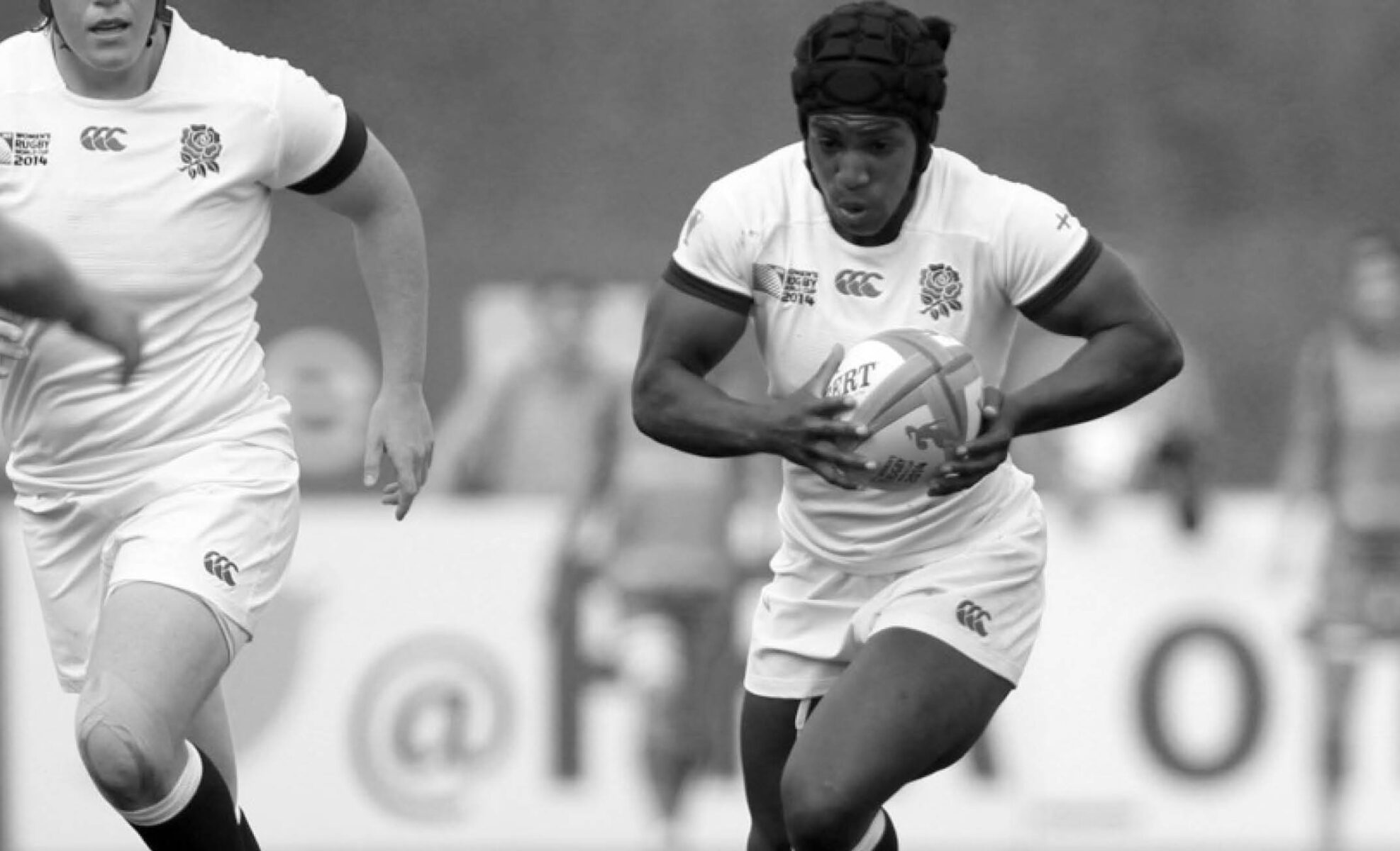
Red Roses Rising
Why is 2025 a landmark year for women’s rugby? England’s Maggie Alphonsi MBE and Hannah Botterman delve into the evolution of the sport, the joy of the game, and what the Women’s Rugby World Cup means for rugby and women’s sport.
By Glorious
Sitting down with Maggie Alphonsi and Hannah Botterman in the lead-up to the Women’s Rugby World Cup 2025, one immediately senses the unique blend of wisdom and youthful energy these two exceptional women bring to the sport. Maggie, a true legend of English rugby, has a rich history within the game and now works tirelessly to shape its future. Meanwhile, Hannah represents the next generation of talent, poised to lead England to victory at the 2025 Women’s World Cup. As we explore their thoughts on the game, it becomes abundantly clear that they share a deep belief in the continued evolution of women’s rugby and the impact a home tournament will have for women’s sport across the UK.
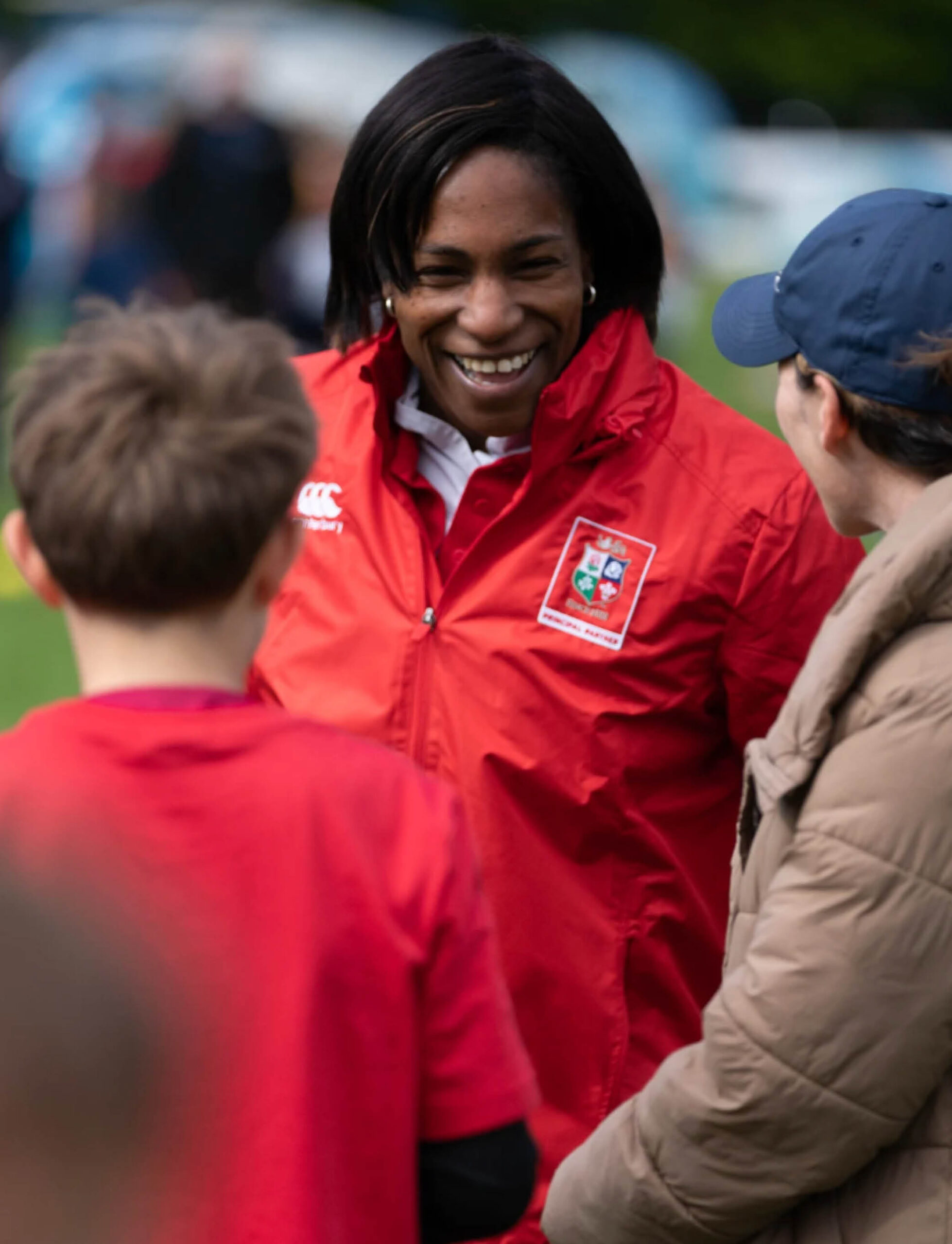
Maggie’s journey into rugby came almost by chance. Growing up in an era with fewer opportunities for girls in sport, her path to the pitch wasn’t set from childhood. Instead, it began in her early teens when her PE teacher, Liz Burgess, encouraged her to give the game a try. Liz, who also captained the Saracens, became a guiding figure for Maggie, inspiring her to explore the world of rugby. “I loved it instantly,” Maggie says, describing how her physicality and strength found a natural outlet in the sport. That initial leap into rugby set her on a path that would lead to international success and a place in rugby history, becoming one of the sport’s best-known figures.
Maggie’s impact on women’s rugby is undeniable. She represented England with distinction, earning 74 caps, scoring 28 tries, and even being awarded a Member of the Order of the British Empire (MBE) for services to rugby. Her crowning achievement was undoubtedly her role in England’s 2014 World Cup victory—a moment that cemented her as one of rugby’s all-time greats. But her contributions didn’t stop when she hung up her boots. Since then, Maggie has held influential roles within the Rugby Football Union (RFU), advocating for diversity and creating pathways for the next generation of female athletes.
For Hannah, rugby was something of a birthright. With a family steeped in the sport, she was on the rugby field almost as soon as she could walk. Watching her parents, aunt, and uncle play each weekend, rugby became a natural extension of her early life. “I didn’t really have a choice,” she laughs. But it’s a choice she hasn’t regretted, and as the next generation of English rugby talent, Hannah now steps into the spotlight for the upcoming World Cup. Making her England debut in 2017, Hannah quickly became known for her strength and athleticism as a prop, earning a reputation for being as formidable as she is driven. After six successful seasons with Saracens, where she contributed to multiple Premier 15s titles, Hannah joined Bristol Bears in 2023, bringing her experience and skill to the West Country club.
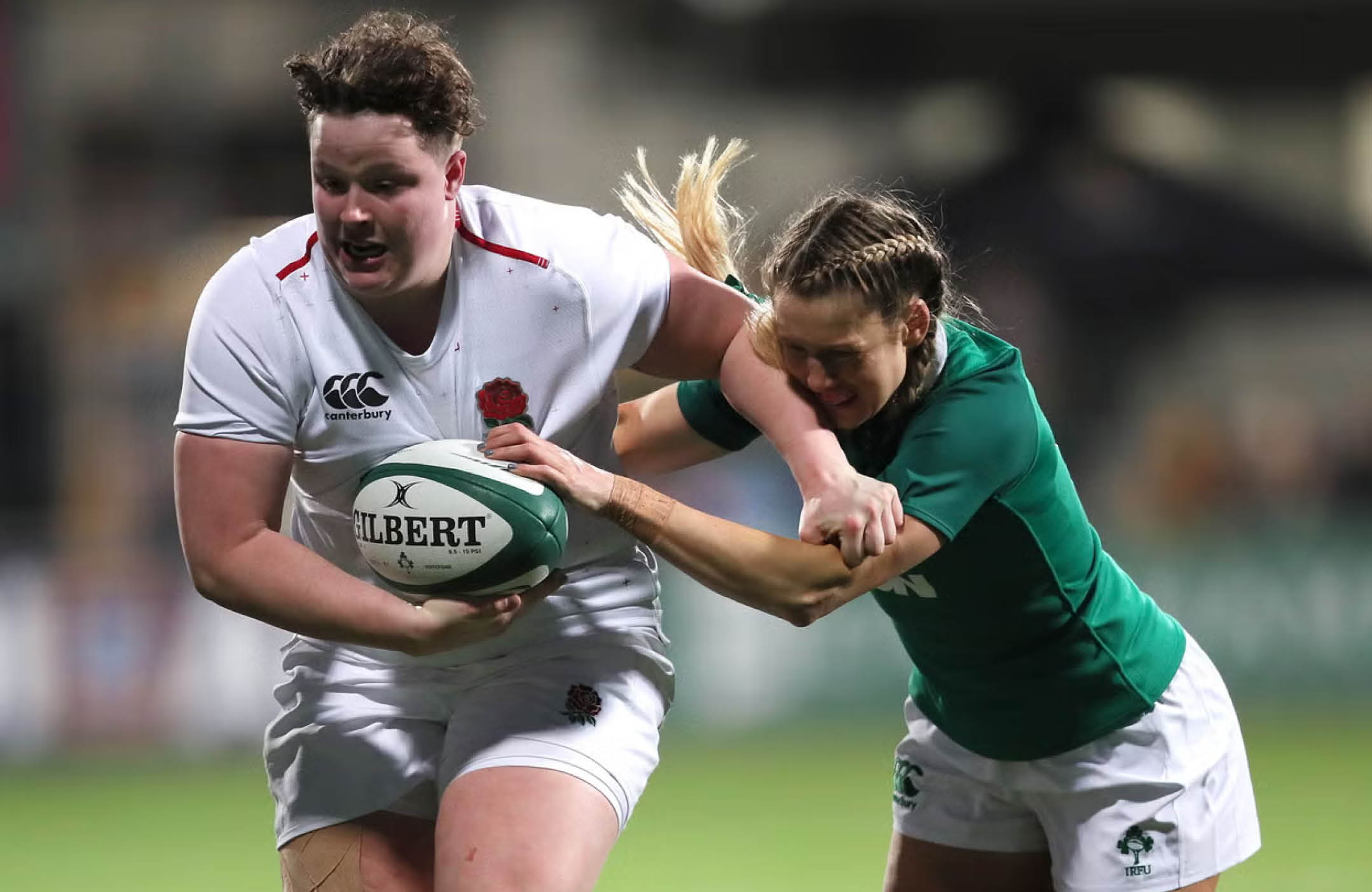
As we discuss the upcoming tournament, Maggie speaks passionately about what it means to have the Women’s Rugby World Cup returning to England. She’s witnessed the remarkable evolution of the game, and this tournament feels like a culmination of years of growth and dedication. With eight host cities and sixteen teams competing, it’s a scale she could hardly have imagined when she first picked up a rugby ball. “It’s the biggest global event for women’s rugby,” she shares, clearly thrilled by the response from fans. With over 130,000 tickets already sold, Twickenham Stadium is on track to sell out for the final. This historic milestone illustrates the incredible rise in support and the potential of the women’s game.
Hannah, too, feels the weight and significance of this moment. England’s growing interest in women’s rugby has been encouraging, and she hopes the World Cup will bring even more fans into the sport. She envisions a future where packed stadiums, increased participation, and greater recognition are the norm. “This has probably come at the perfect time,” she shares. “Women’s rugby is right on the edge of becoming a real spectator sport, with more fans showing up. Next year, hopefully, it blows up like we saw with the Euros! We want more people down at club games, internationals—not just for us, but for the Home Nations and around the world.”
The World Cup is set to break records and attract unprecedented crowds, both acknowledge that broader systemic support is crucial for the sport to reach its full potential. While the increase in visibility has bolstered the game, ongoing funding gaps and limited media coverage still present significant hurdles. The recent introduction of full-time professional contracts for England’s women’s players signals a shift. In June 2023, the RFU awarded three-year contracts to 32 senior players, a move that allows them to focus entirely on their rugby careers and sets an example for young athletes.
Other nations are making strides too. In September 2024, the Welsh Rugby Union announced 37 full-time professional contracts for Wales Women. Yet many teams competing in the World Cup still rely on semi-professional or amateur structures.

Initiatives like World Rugby’s Impact Beyond 2025 are pivotal in tackling these challenges, working alongside the RFU’s domestic Impact ’25 programme to accelerate the growth of women’s rugby and help the RFU achieve its ambition of 100,000 female players by 2027. Impact Beyond 2025 seeks to harness the momentum of the Women’s Rugby World Cup, driving long-term global growth by increasing participation, strengthening professional pathways, and promoting gender equity. Meanwhile, the RFU’s Impact ’25 programme, with £12.13 million in government funding, focuses on grassroots development in England, investing in four core areas: facilities, coaching, volunteer engagement, and community-building. Together, these initiatives strive to make rugby accessible to women and girls at every level, creating a lasting legacy for the sport.
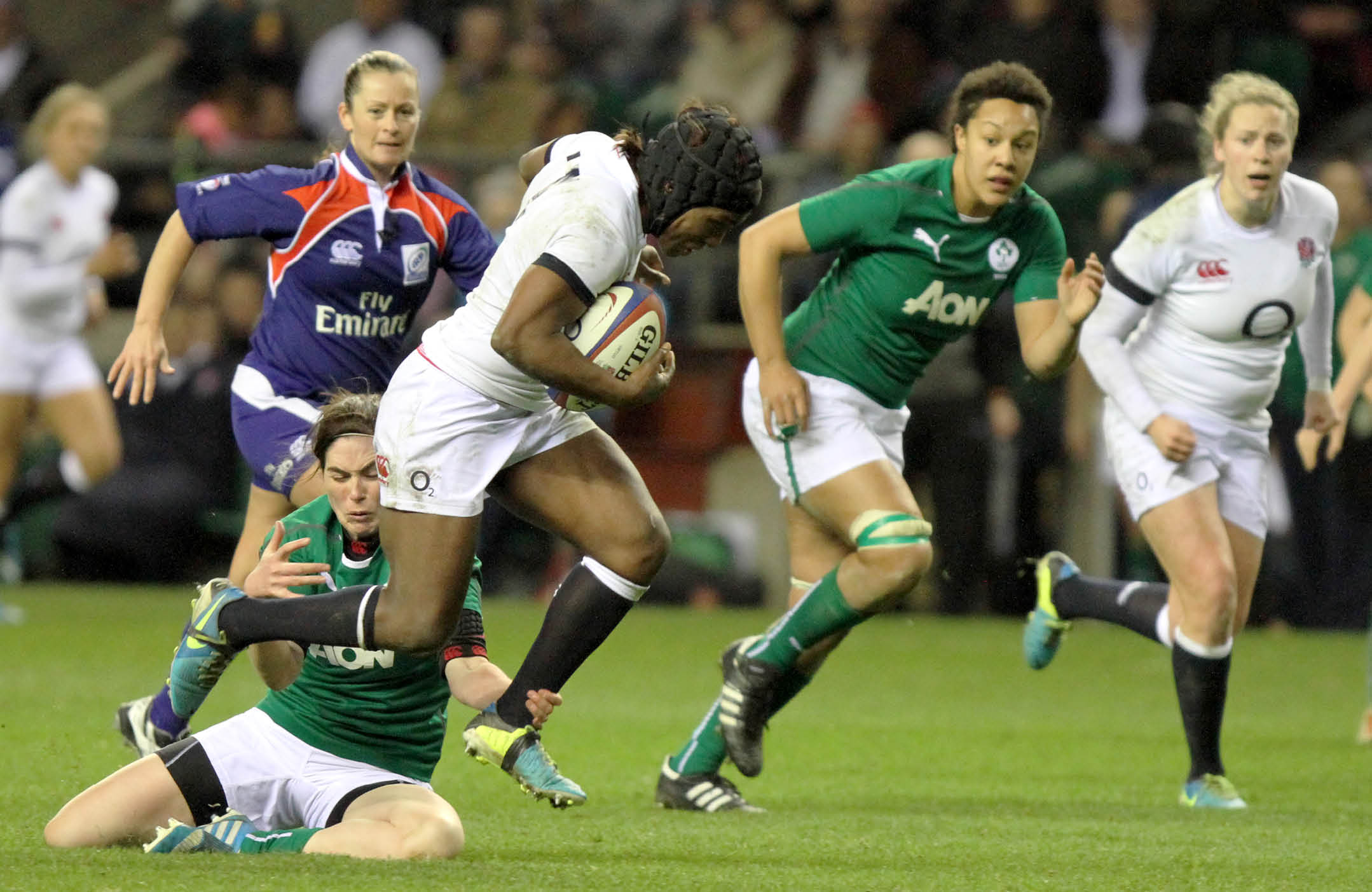
visibility

Both players see the importance of initiatives like these. “I had to practically beg my PE teacher and loads of the girls to play rugby when I was younger! We eventually got a team, but I think we should be encouraging more kids to play,” Hannah notes. “I’d love to see more touch rugby at schools, even at primary level.” Maggie agrees, adding, “Options like tag or touch rugby at schools can be a great way for kids to find their way to a club. Plus, making rugby welcoming and inclusive is key, and our clubs are doing a great job of ensuring facilities are inviting and open for everyone.”
The power of role models in inspiring young girls to take up rugby is something both Maggie and Hannah firmly believe in. For Maggie, her sporting hero has always been Denise Lewis. “What a legend!” she enthuses. “She was my role model growing up—she looked like me and had a similar background to mine. She’s achieved so much beyond her sporting career. I’m in awe of her, especially with her work in governance and broadcasting.”
Research underscores the impact of role models in fostering positive influence and encouraging girls to participate in sport. A study by OnePoll found that half of young girls are inspired to take up sport after witnessing the success of female athletes, with 65% experiencing a confidence boost and 55% feeling more capable of achieving anything. Maggie hopes that young girls today will find similar inspiration in players like Hannah and aim to reach similar heights. Hannah echoes this sentiment, saying, “I’d like to think that younger girls have someone they look up to in rugby and can say, ‘I aspire to be like them.’ That’s really special.” She credits Maggie with inspiring her own journey: “The only real player I knew of in women’s rugby when I was younger was Maggie!”
Platforms like TikTok and Instagram are also playing an instrumental role in reaching a new generation of fans. Viral clips of Red Roses games, training moments, and behind-the-scenes content have introduced a wider audience to the sport. Then there are the personalities, like American rugby star Ilona Maher, whose meteoric rise to global stardom is a testament to the power of relatable social content. Known for her engaging personality and body-positive, rugby-positive posts, Maher’s following surged after her appearances at the Tokyo and Paris Olympics, attracting fans well beyond traditional rugby circles. Hannah laughs, “It’s great! Someone who might not know anything about rugby likes her content, gives rugby a chance, and becomes a fan of the game.” Maggie adds, “Ilona’s relatable, not just to those who like rugby but to people who don’t even know it. Imagine her playing for USA 15s against England in Sunderland; the media attention would be incredible. We need more personalities like her!”
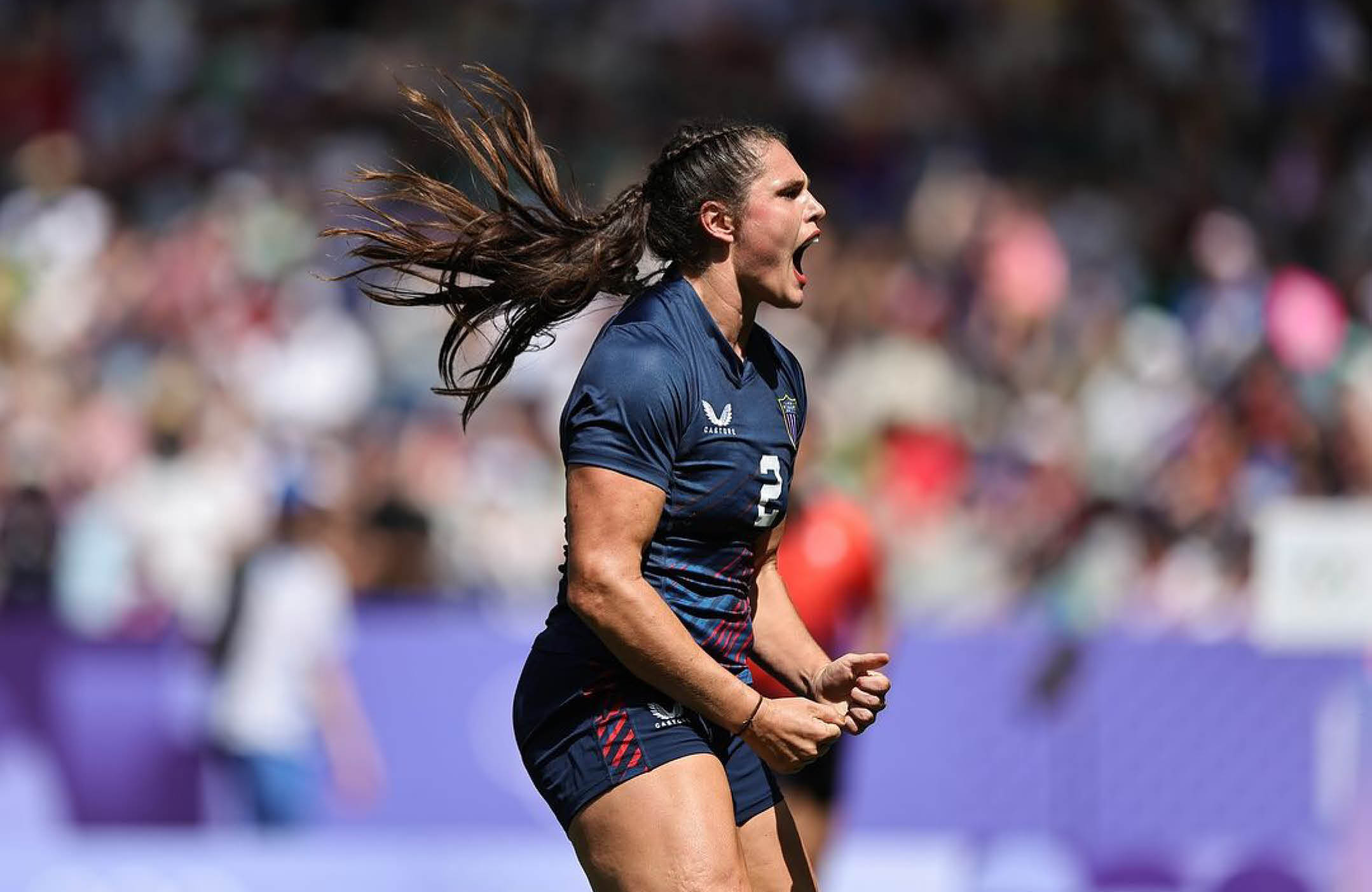
And the influence of these visible role models is clearly making waves. Whether they’re Red Roses icons, Olympic standouts, or social media sensations, they’re driving a surge in female participation. According to World Rugby, in 2023, women and girls make up over a quarter of the global rugby-playing population, with female participation reaching an all-time high of 2.7 million players.
As our conversation winds down, it’s clear that, though Maggie and Hannah belong to different generations in English rugby, they share a common purpose. For both, rugby is more than a sport; it’s a community that has shaped their lives and given them a profound sense of belonging. While Maggie’s path carved out opportunities that didn’t exist before, Hannah’s journey is one of making those opportunities count. For Maggie, rugby has become a platform to champion inclusion, with dreams that stretch beyond wins and losses. She envisions a world where every girl can discover the power and camaraderie of the game.
Meanwhile, Hannah is focused on bringing home the World Cup, her ambition capturing the same spirit that drove Maggie years ago. Together, they represent the story of women’s rugby: Maggie, the trailblazer who laid the groundwork, and Hannah, the promising next chapter. Both are pushing the sport forward, ensuring rugby’s future is brighter, bolder, and open to all who want to play.
If the anticipation is catching, now’s the time to show your support for women’s rugby. The Women’s Rugby World Cup 2025 kicks off across England from 22 August to 27 September, with 16 teams competing at eight landmark venues, including Sunderland’s Stadium of Light and London’s Twickenham Stadium. Whether you’re in the stands, watching with friends in the pub, or following the journey online, every presence helps bring women’s rugby closer to the recognition it deserves! General sale ticket applications for all matches are available until 11:00AM (GMT) 19 November 2024 so be quick! Click here to buy!
